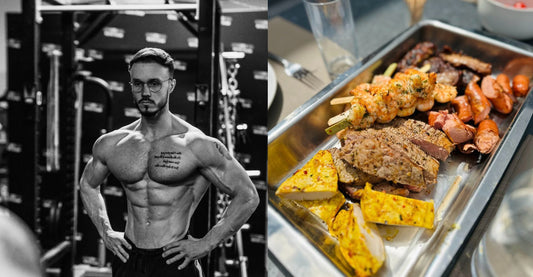
How to deal with the holidays?
But is this correct?
First and foremost, I want to make it clear that this is a normal feeling that many people have and that it is not a problem.
As you have probably heard, and I hope in one of our blogs, to gain 1kg of fat in a day you need to eat at least 7700 extra calories on top of the number of calories you normally need to eat to keep your weight stable. to hold. This is approximately equivalent to 15 Big Macs from McDonalds. Good luck with this!
Take your freedom into your hands
A strategy I often recommend is to work with a weekly calorie budget. Think of it as a monthly salary. If you spend more at the start of the month, you will have less left over for the rest of the month. Calories work in a similar way. If you spend less at the beginning of the week, you will have a little more to spend during Christmas or New Year's Eve.
Strategies
There are other strategies you can use to deal with this. Let's go over them.
By creating a buffer, we mean cutting out some calories during the day to have more calories to spend in the evening.
Always reduce carbohydrates and/or fats, but never proteins. Proteins play an outsized role in hunger and satiety, as well as other functions in the body.
What can you leave out or reduce?
Carbohydrates: potatoes, rice, grains, pasta, oatmeal, granola, rice waffles, bread, fruit…
Fats: nuts, peanut butter, seeds, kernels, avocado, oils, peanut butter, chocolate…
First and foremost, I want to make it clear that fasting is not magic and will make you miraculously healthier. It is a tool that can be used to save calories so that you can spend more in the evening.
How do you best approach this? If possible, sleep a little longer, so you can skip breakfast if necessary. Be careful with this! Only skip breakfast if you are not hungry. The danger is that hunger will otherwise hit harder and could cause you to eat far too much.
Take an extra walk or integrate an extra workout so you will have some extra calories to spend on Christmas or New Year's Eve. Be aware that exercise itself does not burn as many calories as people once thought.
Beware of the vicious circle of overcompensation! You compensate during the day to have a little extra in the evening, but the next day the feeling that you have eaten too much and the associated guilt prevails. This makes you think, I'm compensating for something, but this stimulates that feeling of hunger even more. To counteract this, you eat a little, but you notice that it is difficult to stop and you eat a little more. This makes you feel guilty again and you start to compensate again, reinforcing that feeling of hunger...
Conclusion
It is not the period between Christmas and New Year that determines your progress. It is the period between New Year and Christmas. Make conscious and wise choices to compensate for this. It will never be perfect, but this is okay too. This period is mainly about enjoying and being together with friends and family. So panic is certainly not appropriate. And no, your progress will not be gone.
Happy Holidays!



